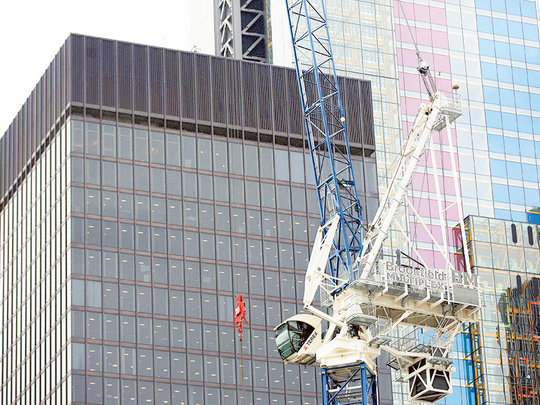
London: The wave of office buildings under construction in London is a bigger threat to rents and values than the risk of companies moving out after the UK’s vote to leave the European Union (EU), according to UBS Group AG.
“We saw a build-up of oversupply of office space long before Brexit, which can’t be stopped,” Thomas Wels, global head of real estate at the Zurich-based bank’s asset-management unit, said in an interview. The additional space “will hit the market in 2017 and 2018 and isn’t priced into rents.”
Developers tried to capitalise on rising rents by starting work on a record number of central-London office projects in the six months through March. Values may decline as much as 20 per cent there as companies consider moving some operations to continental Europe or delay expansion plans following the vote, according to Green Street Advisors.
International businesses could shift as many as 100,000 jobs away from London within two years of the UK officially starting a process to leave the EU because they risk losing their passporting rights, Jefferies Group LLC analyst Mike Prew said in June. Wels, who oversees $77 billion of real estate assets in 29 countries, estimates the number of jobs that move will be closer to 25,000.
UK commercial-property values probably had their steepest decline since December 2008 in July following the vote for Brexit, Osmaan Malik, a London-based analyst at UBS, wrote in an August 4 report. Office prices fell 6.1 per cent in the City of London financial district in July on heightened economic uncertainty, especially for financial-services firms, broker CBRE Group Inc. said on Monday.
Construction began on 51 office buildings in central London in the six months through March and the amount of space being developed almost doubled in 18 months, Deloitte LLP said in a May report.
UBS will invest about $3 billion in property in European nations other than the UK over the next two to three years as the economy continues to recover, Wels said. Economic growth in the euro region will reach 1.6 per cent this year, compared with 0.3 per cent in Japan, the International Monetary Fund forecasts.
Asian demand
Asian pension funds will target continental European property as they increase allocations to real estate, according to Wels. Japan’s top-ten pension funds alone may acquire $200 billion of European property over the next decade, he said.
“In Japan, returns are too small and the market isn’t big enough to invest domestically,” Wels said. “In Europe returns are high, legislation is sound and investors can achieve diversification.”
Wels favours investing in multifamily properties, stores and offices in Spain, Italy and Germany, he said.
“Outside of Germany and the Netherlands, which already have very mature rental markets, residential will be the thing of the future,” Wels said.











